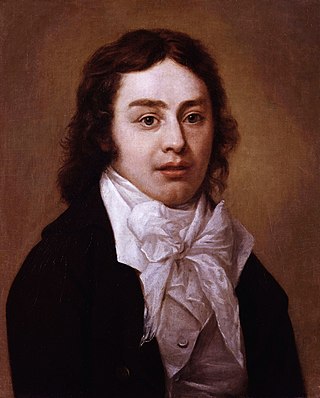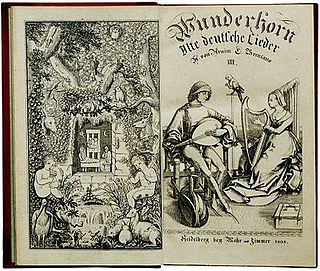Related Research Articles

Romanticism was an artistic and intellectual movement that originated in Europe towards the end of the 18th century. The purpose of the movement was to advocate for the importance of subjectivity, imagination, and appreciation of nature in society and culture in response to the Age of Enlightenment and the Industrial Revolution.

Samuel Taylor Coleridge was an English poet, literary critic, philosopher, and theologian who was a founder of the Romantic Movement in England and a member of the Lake Poets with his friend William Wordsworth. He also shared volumes and collaborated with Charles Lamb, Robert Southey, and Charles Lloyd.

William Wordsworth was an English Romantic poet who, with Samuel Taylor Coleridge, helped to launch the Romantic Age in English literature with their joint publication Lyrical Ballads (1798).

Robert Southey was an English poet of the Romantic school, and Poet Laureate from 1813 until his death. Like the other Lake Poets, William Wordsworth and Samuel Taylor Coleridge, Southey began as a radical but became steadily more conservative as he gained respect for Britain and its institutions. Other romantics such as Byron accused him of siding with the establishment for money and status. He is remembered especially for the poem "After Blenheim" and the original version of "Goldilocks and the Three Bears".

In literature, Romanticism found recurrent themes in the evocation or criticism of the past, the cult of "sensibility" with its emphasis on women and children, the isolation of the artist or narrator, and respect for nature. Furthermore, several romantic authors, such as Edgar Allan Poe, Charles Maturin and Nathaniel Hawthorne, based their writings on the supernatural/occult and human psychology. Romanticism tended to regard satire as something unworthy of serious attention, a view still influential today. The Romantic movement in literature was preceded by the Enlightenment and succeeded by Realism.

Dorothy Mae Ann Wordsworth was an English author, poet, and diarist. She was the sister of the Romantic poet William Wordsworth, and the two were close all their adult lives. Dorothy Wordsworth had no ambitions to be a public author, yet she left behind numerous letters, diary entries, topographical descriptions, poems, and other writings.

Lyrical Ballads, with a Few Other Poems is a collection of poems by William Wordsworth and Samuel Taylor Coleridge, first published in 1798 and generally considered to have marked the beginning of the English Romantic movement in literature. The immediate effect on critics was modest, but it became and remains a landmark, changing the course of English literature and poetry. The 1800 edition is famous for the Preface to the Lyrical Ballads, something that has come to be known as the manifesto of Romanticism.

Romantic poetry is the poetry of the Romantic era, an artistic, literary, musical and intellectual movement that originated in Europe towards the end of the 18th century. It involved a reaction against prevailing Enlightenment ideas of the 18th century, and lasted approximately from 1800 to 1850. Romantic poets rebelled against the style of poetry from the eighteenth century which was based around epics, odes, satires, elegies, epistles and songs.
The Lake Poets were a group of English poets who all lived in the Lake District of England, United Kingdom, in the first half of the nineteenth century. As a group, they followed no single "school" of thought or literary practice then known. They were named, only to be uniformly disparaged, by the Edinburgh Review. They are considered part of the Romantic Movement.
Western literature, also known as European literature, is the literature written in the context of Western culture in the languages of Europe, and is shaped by the periods in which they were conceived, with each period containing prominent western authors, poets, and pieces of literature.

"Darkness" is a poem written by Lord Byron in July 1816 on the theme of an apocalyptic end of the world which was published as part of the 1816 The Prisoner of Chillon collection.
Nationality words link to articles with information on the nation's poetry or literature.
The Romantic hero is a literary archetype referring to a character that rejects established norms and conventions, has been rejected by society, and has themselves at the center of their own existence. The Romantic hero is often the protagonist in a literary work, and the primary focus is on the character's thoughts rather than their actions.

"Ode: Intimations of Immortality from Recollections of Early Childhood" is a poem by William Wordsworth, completed in 1804 and published in Poems, in Two Volumes (1807). The poem was completed in two parts, with the first four stanzas written among a series of poems composed in 1802 about childhood. The first part of the poem was completed on 27 March 1802 and a copy was provided to Wordsworth's friend and fellow poet, Samuel Taylor Coleridge, who responded with his own poem, "Dejection: An Ode", in April. The fourth stanza of the ode ends with a question, and Wordsworth was finally able to answer it with seven additional stanzas completed in early 1804. It was first printed as "Ode" in 1807, and it was not until 1815 that it was edited and reworked to the version that is currently known, "Ode: Intimations of Immortality".

Mont Blanc: Lines Written in the Vale of Chamouni is an ode by the Romantic poet Percy Bysshe Shelley. The poem was composed between 22 July and 29 August 1816 during Shelley's journey to the Chamonix Valley, and intended to reflect the scenery through which he travelled. "Mont Blanc" was first published in 1817 in Percy Shelley and Mary Shelley's History of a Six Weeks' Tour through a Part of France, Switzerland, Germany and Holland, which some scholars believe to use "Mont Blanc" as its culmination.

The conversation poems are a group of at least eight poems composed by Samuel Taylor Coleridge (1772–1834) between 1795 and 1807. Each details a particular life experience which led to the poet's examination of nature and the role of poetry. They describe virtuous conduct and man's obligation to God, nature and society, and ask as if there is a place for simple appreciation of nature without having to actively dedicate one's life to altruism.
Opium and Romanticism are well-connected subjects, as readers of Romantic poetry often come into contact with literary criticisms about the influence of opium on its works. The idea that opium has had a direct effect on works of romantic poetry is still under debate; however, the literary criticism that has emerged throughout the years suggests very compelling ideas about opium and its impact on Romantic texts. Usually these criticisms tend to focus on poets such as Samuel Taylor Coleridge, Thomas De Quincey and George Crabbe.
The sublime in literature refers to the use of language and description that excites the senses of the reader to a degree that exceeds the ordinary limits of that individual's capacities.

The sonnet was a popular form of poetry during the Romantic period: William Wordsworth wrote 523, John Keats 67, Samuel Taylor Coleridge 48, and Percy Bysshe Shelley 18. But in the opinion of Lord Byron sonnets were “the most puling, petrifying, stupidly platonic compositions”, at least as a vehicle for love poetry, and he wrote no more than five.

Romanticism was an artistic, literary, and intellectual movement that originated in Europe toward the end of the 18th century. Scholars regard the publishing of William Wordsworth's and Samuel Coleridge's Lyrical Ballads in 1798 as probably the beginning of the movement in England, and the crowning of Queen Victoria in 1837 as its end. Romanticism arrived in other parts of the English-speaking world later; in the United States, about 1820.
References
- 1 2 Carlyle, Thomas. The French Revolution: A History Volume I. London: J.M. Dent and Sons, Ltd, 1906. Pp. viii-xi, 45-50.
- 1 2 3 4 5 Hancock, Albert Elmer. The French Revolution and the English Poets: A Study in Historical Criticism. New York: Henry Holt and Company, 1899. Pp. 7, 45-79.
- ↑ Gregory, Allene. "The French Revolution and the English Novel". New York: The Knickerbocker Press, 1915. Pp. v-viii, 15-48, 270-282.
- 1 2 Daiches, David. A Critical History of English Literature, Volume 2. New York: Ronald Press Co., 1960. Pp. 860-875.
- 1 2 Christensen, Jerome. Romanticism at the End of History. Baltimore: The Johns Hopkins University Press, 2000. Pp. 9-20, 72-74.
- ↑ Dieterle, Bernard, Engel, Manfred, and Gillespie, Gerald. "Romantic Prose Fiction". Philadelphia: John Benjamins Publishing Company, 2008. Pp. 1-21.
- ↑ Towne, Edward Cornelius. Library of the World's Best Literature: Biographical Dictionary. New York: R. S. Peale and J. A. Hill Publishers, 1898.
- 1 2 Page, Curtis Hidden. British Poets of the Nineteenth Century. New York: Benj. H. Sanborn & Co., 1918. Pp. v-vii.